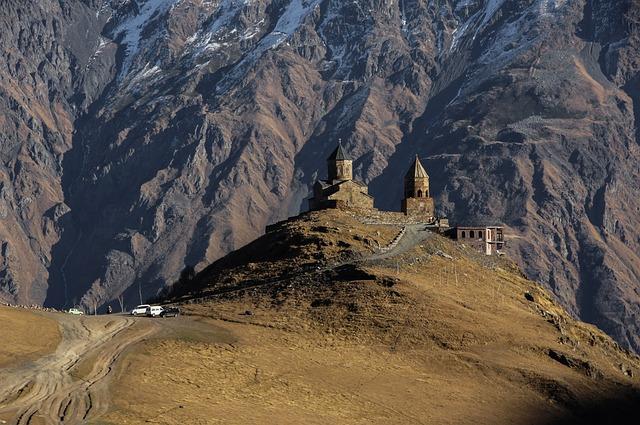In a stark denunciation of governmental authorities’ actions, a Georgian rights official has condemned the alleged use of torture against protesters, highlighting escalating concerns over human rights practices in the country. This condemnation follows a series of demonstrations that have erupted across Georgia, ignited by public discontent over political governance and socio-economic issues. As the situation unfolds, the statement from the rights official underscores the urgent need for accountability and adherence too human rights standards, prompting calls for an independent examination into the reported abuses. Amidst rising tensions, this growing focus on the protection of civil liberties spotlight the critical intersection of state power and citizen rights in Georgian society.
Georgian Rights Official Calls for Accountability in Alleged Torture Cases
In a strong statement that reflects growing concerns over state actions, a prominent Georgian rights official has denounced the alleged use of torture against protesters during recent demonstrations. This condemnation comes amidst mounting evidence suggesting that some individuals were subjected to inhumane treatment by security forces, raising serious questions about their accountability. Witness accounts and video footage from the protests depict instances of violent suppression, igniting widespread outrage among human rights advocates both locally and internationally.
The official highlighted key actions that must be undertaken to address these serious allegations, emphasizing the importance of clear investigations and legal accountability. Among the proposed measures are:
- Independent Investigations: Ensuring that all allegations of torture are rigorously examined by neutral parties.
- Reporting Mechanisms: Establishing accessible channels for victims to report abuses without fear of retaliation.
- Training for Law Enforcement: Implementing extensive human rights training for police and security personnel.

Examining the Impact of Police Brutality on Public Protests in Georgia
The recent condemnation by a Georgian rights official regarding the alleged use of torture against protesters has sparked critical discourse about the intertwining of police brutality and public dissent in Georgia. Reports indicate that various state-sanctioned practices have not only violated civil liberties but have also plunged the country into heightened tensions between law enforcement and civilians. Human rights groups have raised alarms about the ways in which police actions have hindered the right to protest, pointing to instances of excessive force and arbitrary detentions as methods employed to suppress dissenting voices. Such tactics may lead to a chilling effect on public participation in future protests, as citizens fear for their safety in exercising their rights.
the implications of these actions extend beyond immediate concerns for individual protesters. Communities are increasingly polarized, with many citizens rallying in solidarity against perceived injustices while others remain fearful of state reprisals. Key factors include:
- Escalated Violence: Incidents of police violence have prompted responses that often mirror the aggression displayed by authorities.
- Public Distrust: Confidence in law enforcement has plummeted, leading to a lack of cooperation between the police and community members.
- International Attention: Increased scrutiny from global human rights organizations raises stakes for the Georgian government, making accountability essential.
To better understand the gravity of this issue, the following table outlines meaningful events related to police actions against protesters in recent months:
| Date | event | Outcome |
|---|---|---|
| June 2023 | Protest against government policy | Dozens injured; rights groups intervened |
| July 2023 | Mass arrests during march | International condemnation; calls for reform |
| August 2023 | Video footage of police brutality surfaces | Government investigation launched |

Human Rights Organizations Urge international Community to Intervene
In light of recent events in Georgia, numerous human rights organizations are expressing grave concern over the reported use of severe methods against protesters. These groups are calling on the international community to take immediate action to address what they consider blatant violations of human rights. Reports have surfaced indicating that law enforcement officials employed tactics commonly associated with torture, raising alarms about the treatment of individuals exercising their right to peaceful assembly. The situation has generated widespread condemnation, not only from local citizens but also from various global entities advocating for justice and accountability.
The international community’s response is crucial to ensuring that those responsible for these abuses are held accountable and that measures are taken to prevent future occurrences.The advocacy groups emphasize the importance of adherence to established human rights norms, which serve as the backbone of democratic societies. A collaborative effort involving governmental and non-governmental organizations can lead to significant reform and protection for individuals at risk. Key actions proposed include:
- Monitoring human rights violations: Establishing independent bodies to oversee and report on the situation in Georgia.
- Imposing sanctions: Considering targeted sanctions against individuals involved in the perpetration of violence.
- Supporting local activists: Providing necessary resources and protection for local human rights defenders.

Recommendations for Reforms in Georgian Law Enforcement Practices
The recent condemnation of law enforcement’s use of torture against protesters highlights the urgent need for reforms within Georgian policing practices. To foster a healthier relationship between the state and its citizens, several key reforms should be prioritized:
- Implementation of Comprehensive Training Programs: Law enforcement officials should undergo rigorous training focused on human rights, conflict de-escalation, and proper crowd control techniques.
- Establishment of Independent Oversight Bodies: Create independent bodies to monitor law enforcement actions, ensuring accountability and transparency in the handling of protests and demonstrations.
- Adoption of Clear Use-of-Force Guidelines: Develop and publicize explicit policies regarding the acceptable use of force, prioritizing non-violent methods in managing civil dissent.
- Enhanced legal Protections for Protesters: Introduce legal frameworks that protect the rights of individuals participating in peaceful protests, discouraging arbitrary arrests and violent responses from law enforcement.
Along with the above recommendations, collaborative efforts between civil society organizations and law enforcement agencies can facilitate meaningful dialogue aimed at reform. A structured approach to reforming law enforcement practices can be organized in a phased manner:
| Phase | action | Expected Outcome |
|---|---|---|
| Phase 1 | Stakeholder Engagement | Inclusive discussions on necessary reforms. |
| Phase 2 | Policy Progress | Creation of clear, actionable policies. |
| Phase 3 | Training Implementation | Execution of training programs for police personnel. |
| Phase 4 | Monitoring and Evaluation | Continuous assessment of reforms and their impacts. |

The Role of Media in Exposing Abuses During Civil Unrest
The media plays a crucial role in documenting and disseminating facts regarding abuses during civil unrest, acting as a vital watchdog in society. By providing real-time coverage, journalists can capture instances of police brutality, excessive use of force, and human rights violations. Their reports not only raise public awareness but also serve as a historical record that can be referenced for legal and political accountability. In countries like Georgia, where political tensions frequently enough explode into mass protests, independent media coverage is essential to ensure transparency and protect the rights of citizens. This exposure often compels authorities to respond, as the international community and local populations demand justice and reforms.
Furthermore, social media platforms have transformed the landscape of reporting, allowing citizens to share their experiences and document abuses live as they happen. This grassroots journalism not only complements traditional media but also amplifies marginalized voices. Significant findings from various reports can be summarized as follows:
| Type of abuse | Media Response | Impact |
|---|---|---|
| Physical Violence | Investigative Reporting | Increased scrutiny on law enforcement |
| Arbitrary Detention | social Media Campaigns | Pressure for legal transparency |
| Intimidation of Protesters | Documentary Features | International advocacy |
This landscape emphasizes the need for a resilient media surroundings where journalists can operate freely and safely, providing a platform for the truth amid the chaos of civil unrest. Such efforts not only highlight the violations occurring on the ground but also foster a culture of accountability and action among citizens and government officials alike.

future of Protests in Georgia Amidst Growing Concerns Over state Violence
As protests surge in Georgia, concerns about state violence cast a shadow over the democratic process. Amidst denouncements from rights officials regarding the treatment of demonstrators, the use of excessive force has become a focal point of national discourse. Reports of torture and mistreatment have emerged, compelling activists and government officials alike to address the escalating tensions. The urgency to reform policing practices and ensure accountability is palpable, as the international community watches closely the unfolding events in the nation.
The impact of these issues is reflected in the growing number of organizations advocating for the rights of protesters. Key players in the civil rights movement are mobilizing to shine a light on this alarming trend of brutality, with their efforts aimed at initiating dialogues for reform. A recent gathering brought together various groups to discuss strategies for promoting peaceable assembly and protecting human rights, emphasizing the need for a united front against oppression.This landscape is changing rapidly, revealing a stark divide between government actions and public sentiment, as citizens increasingly demand transparency and justice for peaceful demonstrations.
| Concerns Raised | Actions Proposed |
|---|---|
| Excessive Use of Force | Immediate police reform |
| Torture Allegations | Accountability measures |
| Detention of Protesters | Legal support initiatives |
| Media Censorship | Encouraging free press |
Concluding Remarks
the recent condemnation by the Georgian rights official highlights the urgent need for accountability and reform in the handling of protests within the country. As clashes between demonstrators and law enforcement escalate, the allegations of torture and mistreatment raise significant concerns regarding human rights and the rule of law in Georgia. As the situation develops, the international community will be closely monitoring the government’s response and the ongoing implications for civil liberties and protest rights. continued advocacy for transparency and justice is essential to ensure that the rights of citizens are upheld, and that such incidents do not undermine the democratic values that underpin Georgian society.
















